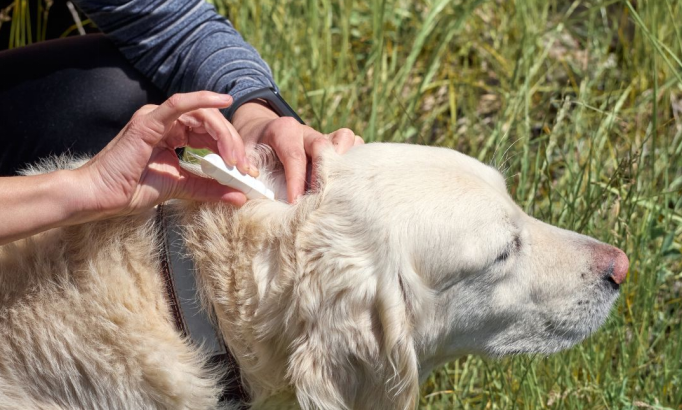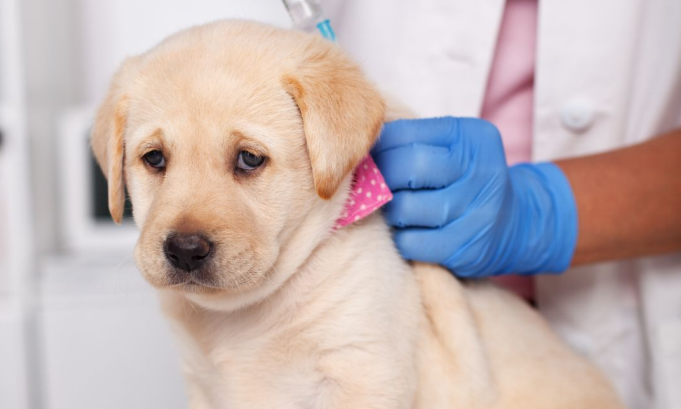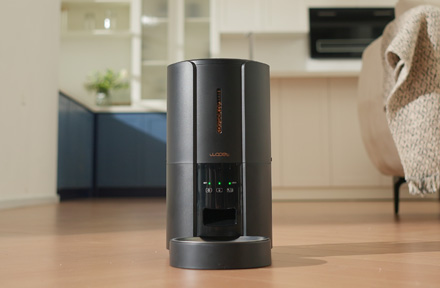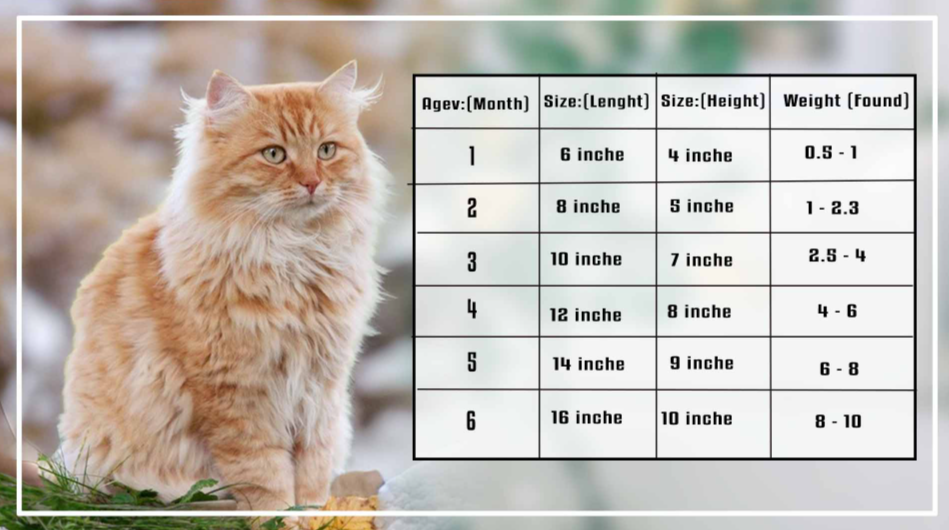Aug 18, 2025
Author:Amanda Lyu

Your vet hands you a vaccination schedule. Foreign language, right? Core vaccines, non-core shots, boosters—somehow you're supposed to just know which ones your dog needs when. Here's what nobody tells you: most dogs? They're either getting jabbed with unnecessary vaccines or walking around with zero protection because owners just follow whatever schedule the vet prints out.
The truth is, your 8-week-old puppy and that 8-year-old golden retriever need totally different vaccine strategies. Puppies? They're building immunity from nothing. Adult dogs need boosters, sure, but also lifestyle vaccines that actually match what they do. Mess this up and you're either burning money on pointless shots or—worse—leaving your dog exposed to something preventable.
What we're covering:
● Puppy Vaccination Blueprint (8 weeks - 1 year): When to get which vaccines (down to the week), why that spacing between shots actually matters, and those optional vaccines that really aren't
● Adult & Senior Dog Strategy (1 year+): Making the switch from puppy shots to adult boosters, figuring out which vaccines match your dog's actual life, and why your senior might need a whole different game plan
Keep reading if you're tired of nodding along at the vet without really understanding what's happening. We're making this simple. Your wallet's gonna thank you, too.
Puppy Vaccination Blueprint (8 Weeks to 1 Year)

Your puppy's first year? That's when everything happens immunity-wise. Each vaccine builds on the last one—like stacking blocks until your pup has actual protection. You miss a shot or time it wrong, and suddenly your puppy's walking around vulnerable during the riskiest months of their life.
The Core Vaccine Timeline
Every single puppy needs core vaccines. No exceptions. These cover the killers—the diseases that either end badly or spread like crazy. Your vet won't even ask about these. They just schedule them.
Your puppy's core vaccine roadmap:
|
Age |
Vaccine |
Why It Matters |
|
6-8 weeks |
DHPP (first dose) |
Starts protection against distemper, hepatitis, parainfluenza, and parvovirus |
|
10-12 weeks |
DHPP (second dose) |
Builds on that initial immunity |
|
14-16 weeks |
DHPP (third dose) + Rabies |
Finishes the primary series; rabies is legally required |
|
12-16 months |
DHPP + Rabies boosters |
Locks everything in for the long haul |
Pro tip: See that 14-16 week window? Cannot miss it. Mom's antibodies mess with vaccines given too early, but they fade around 14 weeks. Skip this timing, and you're basically starting from scratch again.
Understanding the DHPP Combo Shot
DHPP combines four vaccines in one needle. Easier on your puppy. But what's actually in there?
Distemper goes after everything—the respiratory system, the digestive tract, nervous system. Dogs who survive? Often have permanent brain damage. Hepatitis (the adenovirus kind) destroys the liver and kidneys. Young puppies can literally die within hours. Parainfluenza causes respiratory infections that rip through kennels and dog parks faster than you'd believe. Then there's Parvovirus.
Parvo needs its own moment here. This virus kills puppies. Attacks the intestinal lining, causing bloody diarrhea, severe vomiting, and massive dehydration. With intensive treatment? Maybe 70% survive. Without it? You're looking at less than 10%. Oh, and the virus stays alive in the environment for years. Sidewalks, grass, the bottom of your shoes—parvo doesn't care.
Non-Core Vaccines That Might Be Core for You
Optional vaccines aren't always optional. Living where ticks are everywhere? The Lyme vaccine isn't optional anymore. Need to board your puppy while you travel? Bordetella's required, not suggested.
Look at your actual situation:
● Bordetella (8-16 weeks): Every boarding place, daycare, and groomer wants this. Annual boosters too
● Lyme (10-12 weeks, booster 2-4 weeks later): Check the CDC tick map—if your county's red, get it
● Leptospirosis (12 weeks, booster 2-4 weeks later): Wildlife pee in puddles spreads this. City dogs need it, too, because rats
● Canine Influenza (10-12 weeks, booster 2-4 weeks later): Big city? Lots of dogs? Yeah, outbreaks happen
Spacing Matters More Than You Think
Immunity doesn't happen overnight. Stack vaccines too close? Your puppy's immune system gets confused, doesn't respond correctly. Wait too long between shots? Start over, friend.
The magic number is 3-4 weeks between doses. Gives the immune system time to recognize what's happening, build antibodies, and get ready for the next round. Go past 6 weeks? You're back at dose one.
What to Expect After Each Shot
Your puppy feels crummy for a day or two after vaccines? That's the immune system doing its job. Little bit of lethargy, maybe not eating as much, slight fever—all normal. Sometimes there's a small bump where the needle went in. Goes away within a week, usually.
Get to the vet NOW if you see:
● Face swelling or hives (that's an allergic reaction)
● Can't stop vomiting or diarrhea
● Trouble breathing
● Your puppy collapses or can barely move
The Socialization Paradox
OK, so here's the problem nobody talks about. Puppies need socialization between 3-14 weeks for their brains to develop right. But they're not fully protected until 16 weeks. See the issue?
Ways to socialize safely:
● Puppy classes where everyone shows vaccine records
● Hanging out with adult dogs, you know, are vaccinated
● Carry your puppy through pet stores (no paws on the floor)
● Stay away from dog parks and rest stops until fully vaccinated
Biggest mistake I see? People wait until their puppy is fully vaccinated before any socialization. By then? That critical window's closed. Behavior problems are way harder to fix than treating the occasional disease exposure.
Adult & Senior Dog Strategy (1 Year and Beyond)

Your dog hits one year old, and everything changes vaccine-wise. You're not building immunity anymore—just maintaining it. Fewer vet trips, which is nice. But now you gotta figure out which boosters actually matter. And when your dog gets older? Different rules again.
The Shift from Annual to Strategic Boosters
That postcard from your vet saying it's vaccine time? Not telling you everything. Research shows tons of core vaccines protect for 3+ years, not one. But vets keep pushing annual everything because... habits, I guess.
What really needs yearly shots vs. what doesn't:
|
Vaccine |
Actual Protection Time |
Real Schedule |
|
DHPP |
3+ years |
Every 3 years after the adult booster |
|
Rabies |
3 years (after first adult shot) |
Every 3 years (unless local law says otherwise) |
|
Bordetella |
6-12 months |
Annual if your dog's around other dogs |
|
Lyme |
1 year |
Annual where ticks live |
|
Leptospirosis |
1 year |
Annual if at risk |
|
Canine Influenza |
1 year |
Annual in outbreak zones |
About rabies—your local government might demand annual vaccines even though the shot lasts three years. Some counties accept the 3-year vaccine, others want yearly paperwork no matter what.
Titer Testing Instead of Automatic Boosters
Wanna know if your dog actually needs that DHPP booster? Titer testing checks antibody levels in the blood. High titers = still protected, skip the vaccine. Low titers = time for a booster.
Titer testing makes sense when:
● Your dog had vaccine reactions before
● Older dogs, you don't want to over-vaccinate
● Traveling internationally and need immunity proof
● You're just not convinced about automatic boosters
Skip titers for:
● Rabies (law doesn't care about your titers)
● Bacterial vaccines—Bordetella, Lyme, Lepto (protection fades fast)
● When the test costs way more than just getting the shot
DHPP titer? $150-300. The vaccine? Maybe $40. But if your dog had a bad reaction last time, that cost calculation changes fast.
Lifestyle Vaccines for Adult Dogs
What your dog does every day determines the vaccines they need. Couch potato dogs have different risks than weekend trail dogs. Makes sense, right?
Activities that need extra protection:
● Regular Boarding/Daycare/Grooming:
○ Bordetella (they all require it)
○ Canine Influenza (more places are asking for this now)
● Hiking and Outdoor Stuff:
○ Leptospirosis (standing water = wildlife pee)
○ Lyme (tick central)
○ Rattlesnake vaccine (Southwest hikers, this one's for you)
● City Dogs:
○ Leptospirosis (rats everywhere)
○ Canine Influenza (so many dogs, so close together)
Your dog's biggest adventure is walking to their food bowl? Skip the rattlesnake vaccine. Never see grass? Probably don't need Lyme protection.
Senior Dogs Need Different Math
Dogs hit 7-8 years old (earlier for giant breeds), and their immune systems get weird. Weaker but also more reactive to vaccines. Fun combination that makes vaccine decisions... interesting. Senior dogs react strongly to vaccines while also needing protection because their immune systems can't fight like they used to. You don't stop vaccines. You don't keep the same schedule either.
Adjustments for senior dogs:
● Space vaccines out—no more multiple shots same day
● Ask for thimerosal-free versions (mercury preservative = stronger reactions)
● Consider half-doses for tiny seniors under 20 pounds
● More titer testing to skip unnecessary vaccines
● Drop non-critical vaccines if your senior never leaves the house
The Over-Vaccination Trap
Vaccine sarcomas (tumors at injection sites)? Rare, but they happen. Autoimmune problems from too many vaccines? Also real. Every vaccine over your dog's lifetime adds a tiny bit more risk.
You might be over-vaccinating if:
● You get every vaccine just in case
● Annual boosters for vaccines that last 3 years
● Vaccinating sick or super old dogs without thinking twice
● Never questioning what the vet suggests
Smart vaccination looks like:
● Matching vaccines to real risks
● Using titers before boosting
● Spreading out multiple vaccines
● Actually keeping vaccine records
When to Break the Rules
Sometimes you gotta throw out the textbook. Chronic conditions, medications, and age all change how vaccines work.
Don't vaccinate if your dog has:
● Active cancer treatment is happening
● Autoimmune disease flaring up
● Any current illness
● Surgery in the last 2 weeks
● Bad reactions to vaccines before
Talk modified schedules if your dog has:
● Immunosuppressive medications
● Pregnancy (some vaccines OK, others not)
● Kidney or liver disease
Your vet should help you figure out the balance. If they want to vaccinate your lymphoma dog because it's on the schedule, get a different vet.
Your Vaccine Schedule's Set—Now Automate Everything Else
You've got the vaccine strategy down. You know what matters, what doesn't, and how to avoid over-vaccination. Between those vet visits, though? Your dog's daily routine needs the same kind of attention to detail.
The vaccine stuff to remember:
● Puppies need precise timing—that 3-4 week spacing, especially the 14-16 week window that makes or breaks immunity
● Adult dogs don't need yearly everything—titers tell you what's needed, lifestyle determines which extras make sense
● Senior dogs get custom plans—spread things out, maybe half-doses for small dogs, definitely skip vaccines for couch-loving seniors
● Over-vaccination is legit—track everything, question those automatic boosters, find a vet who actually listens
You schedule vaccines strategically, right? Same idea with feeding schedules—consistency helps the immune system. The WOpet Heritage View Automatic Pet Feeder handles portions and timing without you thinking about it. Plus, that HD camera means you spot weird behavior between vet visits. Healthy dogs need routines, not just shots on time.
Label:
Popular Post

What to Feed a Sick Dog With No Appetite? [2025 Guide]
May 16, 2023

Troubleshooting Common Issues with Automatic Pet Feeders: Tips & Tricks for Pet Owners
Oct 26, 2023

What is a standard Cat Weight chart by age Kg?
Mar 19, 2025

Why Does My Cat Cough After Drinking Water? 8 Potential Reasons
Mar 13, 2023

Why is My Cat Throwing up Water? Top 5 Causes Here
Feb 08, 2023
$109.99
$129.99
Copyright © 2025 WOPET. All Rights Reserved.